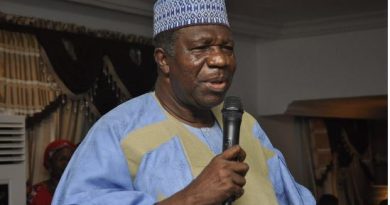The South-West and the emerging politics of religion
Religion has always been manipulated for political ends, especially in Northern Nigeria.
Islamic religious groups “have become one of the veritable tools of political mobilisation in contemporary African democratising societies including Nigeria”, said Musa Kabir Umar of the Department of Political Science, Umaru Musa Yar’adua University Katsina.
Abdullahi Tanko Yakasai, leader of Northern Young Professionals for Tinubu, in an interview with Arise TV in June, said only a Muslim-Muslim ticket would appeal to predominantly Muslim states of the North to garner votes for victory for the presidential candidate of the All Progressives Congress.
“Majority of the states in the North are predominantly Muslim,” he had said. “I think we have only three that are predominantly Christians, Taraba, Benue and Plateau states. Out of the 19 Northern states, the majority are Muslims and why are we shying away from the fact that our party needs those votes. We need to gather those votes to get the presidency come 2023; that is the number one thing.”
Earlier this month, Rabiu Kwankwaso, presidential candidate of the New Nigeria People’s Party, said northerners would not vote for Peter Obi, Labour Party’s presidential candidate.
“What I am telling you is, if anybody now from the South-East under this circumstance becomes the presidential candidate of our party or any other party, the implication is that the activities and many other issues underground, northern voters will certainly go for their northern candidate in another party,” Kwankwaso had said in a Channels TV interview.
When politicians from the North use the word ‘northerner’ within the context of political mobilisation and electioneering, they tend to mean Northern Muslims from the North-West and North-East.
Ahead of the 2023 elections, the South-West, which has for years been sheltered from the religious politics that dominates Northern Nigeria, is now seeing the emergence of politics of religion in the region.
It was the Nobel Prize winner Wole Soyinka who noted the difference between Yoruba religion and the other major world religions, namely Christianity, Islam, and Judaism, which he described as claiming “spiritual monopoly” and “creating a dismal example.”
Soyinka described religion as the “handmaiden of acts of violence” when people fail to recognise that spiritual truths can be captured in many religious constructs and that universal truth is too varied to simply be captured in one system.
Late British sociologist and historian of religion, J.D.Y Peel, said: “The Yorubas have a sense of themselves as being exceptionally tolerant of religious difference – and now particularly of having harmonious relations between Islam and Christianity.”
The region, according to academics Insa Nolte, Clyde Ancarno and Rebecca Jones’ in their 2018 anthropological research on inter-religious relations in Yorubaland, “has not experienced sustained religious conflict, unlike other multi-religious societies elsewhere in Nigeria and beyond. Members of different religions interact with one another frequently, often on an everyday basis.”
The 2023 presidential election will further interrogate the socialised relationship between religion and politics in Nigeria. In the South-West, it will bring to fore the chasm that has been created not with the emergence of Bola Tinubu as the ruling party’s presidential candidate, but a rift generated by his choice of a fellow Muslim as running mate.
“Expecting Nigerians to ignore geo-religious sentiment and vote for the best candidate would be naïve in a country where a third of the country’s states have implemented Sharia law,” The Africa Report said.
Read also: 2023: Muslim-Muslim ticket, a far greater evil than another northern president
Wole Olaoye, a public commentator, in a November 2021 treatise, had lauded the religious tolerance in Yorubaland. “It is understandable that some people from a background of religious acrimony may find the Yoruba brand of tolerance strange,” he said.
According to him, unlike in other parts of Nigeria, Islam in the South-West is part of the progressive movement, not stuck in the middle ages.
In October 2021, the Muslim Rights Concern (MURIC), a Lagos-based organisation, insisted on a preference for a Yoruba Muslim president.
“It is our belief,” Ishaq Akintola, the founder of the organisation, said, “that Yoruba Muslims need federal might to eliminate or at least scale down the tornado of oppression and the Tsunami of anti-Muslim sentiment that pervades the South West. Only a Yoruba Muslim president who knows what has been happening can do this effectively. Who feels it knows it.”
In May, Muhammad Mansur Aliyu, MURIC’s chairman in Sokoto State, urged Muslims in the South-West to register to vote, and vote to make a point.
He said: “Our brothers in the South who are facing persecution on a daily basis must allow their number to count by ensuring that they obtain their voters’ cards. Muslims constitute the majority in a place like the South-West but unfortunately, they are still facing oppression today because they have not been leveraging their majority status.
“The opportunity has now come. Go all out and get your voter’s card. Your voters’ card is your weapon of liberation. A majority population that fails to vote is, technically speaking, a minority. We, therefore, urge you to spare no efforts in getting your voters’ cards in readiness for the 2023 general election.
“We are looking forward to an election that will reveal the true picture in the region. A majority of people that has been turned into a minority due to their apathy for politics must wake up from its deep slumber. We must stop the stereotyping, the segregation, the religious apartheid and the hijab paranoid.”
For perhaps the very first time in the South-West, the people of the region are being drawn into making political choices based on their religious beliefs.

